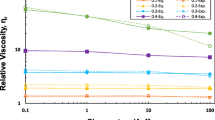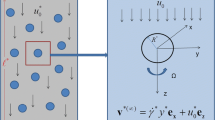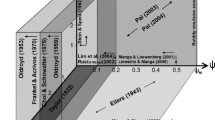Abstract
Colloidal dispersions are common in nature with wide industrial applications. One of the central theoretical problems in the field is to determine the rheological properties of the colloidal dispersion from the microstructures of the systems. Because of the difficulties associated with the boundary-value problems of the many-particle system, existing theories for colloidal suspensions are limited to low particle concentrations. In this work, a method of transformation field is developed by which one can calculate the effective viscosity of an incompressible viscous fluid containing colloidal particles (either solid particles or liquid drops). The predictions of the theory are in good agreement with the Einstein's formula for suspensions and the Taylor's formula for emulsions at low particle concentrations. At higher particle concentrations, the results of Nunan and Keller are produced. The method is also applicable to the viscosity of colloidal systems with non-spherical particles.
Similar content being viewed by others
References
Batchelor G K. Brownian diffusion of particles with hydrodrodynamic interaction[J].J Fluid Mech, 1976,74(1):1–29.
Gu Guoqing, Tao Ruibao. A first-principle approach to effective viscosity of periodic suapension [J].Science in China (series A), 1989,32:1186–1194.
Chow T S. Viscosities of concentrated dispersions[J].Phys Rev E, 1993,48(3):1977–1983.
Taylor G I. The viscosity of a fluid containing small drops of another fluid[J].Proc Roy Soc A, 1931,138(1):41–48.
Einstein A. Eine neue bestimmung der moleküldimensionen annln [J].Phys. (Leipzig), 1906,19: 389–306.
Mellema J, Willemse M W M. Effective viscosity of dispersions approached by a statistical continuum method[J].Physica A, 1981,122(1–2):286–312.
Batchelor G K, Green J T. The determination of the bulk stress in a suspension of spherical particles to order c2[J].J Fluid Mech, 1972,56(3):401–427.
Peterson J M, Fixman M. Viscosity of polymer solutions[J].J Chem Phys, 1963,39:2516.
Takashi Nagatani, Statistical theory of effective viscosity in a random suspension[J].J Phys Soc Jpn, 1979,47(1):320–326.
Mazur P, Van Saarloos W. Many-sphere hydrodynamic interactions and mobilities in a suspension [J].Physica A, 1982,115(1):21–57.
Lord Rayleigh. On the influence of obstacle arrayed in rectangular order upon the properties of a medium[J].Philos Mag, 1892,34:481–502.
Nunan K C, Keller J B. Effective viscosity of a periodic suspension[J].J Fluid Mech, 1984,142 (1):269–289.
Nemat Nasser S, Taya M. On effective moduli of an elastic body containing periodically distributed void[J].Q Appl Math, 1981,39(1):43–59.
Gu Guoqing, Tao Ruibao. A new method for evaluating the dc effective conductivities of composites with periodic structure [J].Phys Rev B, 1988,37(15):8612–8617.
Bedeaux D, Kappal R, Mazur P. The effective shear viscosity of a uniform suspension of spheres [J].Physica A, 1977,88(1):88–121.
Author information
Authors and Affiliations
Additional information
Communicated by Dai Shiqiang
Foundation item: the National Natural Science Foundation of China (19834070)
Biography: Gu Guoqing (1949∼)
Rights and permissions
About this article
Cite this article
Guoqing, G., Kin-wah, Y. A theoretical research to effective viscosity of colloidal dispersions. Appl Math Mech 21, 275–282 (2000). https://doi.org/10.1007/BF02459005
Received:
Revised:
Issue Date:
DOI: https://doi.org/10.1007/BF02459005




